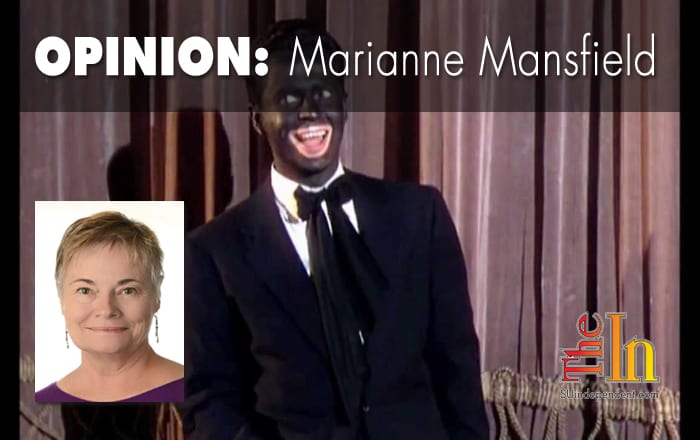Rachel Dolezal missed the boat.

Written by Marianne Mansfield
Sometime in the last century, Dr. Rich Miller was my psychology of exceptionality professor at Miami University. I remember what he looked like but not much about the course other than this single statement, which has stuck with me since the day he uttered it. “When you encounter a person coming toward you on the street, you immediately notice two things about them: their race and their gender.”
At that time, it seemed like a profound absolutism to me. I was a Midwest girl who hadn’t been exposed to much beyond what that cultural landscape had to offer. I’d never heard the word, “transgender,” used in any conversation I was a part of. And, until last week, I’d never heard the word, “transracial,” either.
Dr. Miller’s absolutism seems to have gone the way of the dial telephone. It worked at the time but is now obsolete.
Race and gender distinctions aren’t as clear-cut or defining as they once were. In the 2012 census, approximately 32% of respondents identified as mixed-race. And people in transition from one sex to the other, if not commonplace, are at least not the rarity they were when I was in college.
Caitlyn Jenner, of course, ignited a firestorm of opinion over the issue of transgenderism, and now it seems that Rachel Dolezal has performed a similar feat for transracialism.
Or not.
Are their scenarios two sides of the same coin? Not so much, I think.
Caitlyn Jenner went public in a bold, brave media blitz. She told the world her intensely personal story, which included cross-dressing, thoughts of suicide after her (then his) Adam’s apple was removed, and the anguish of those who loved her. She told about herself, warts and all.
Rachel Dolezal chose a different path. She lied. And lied. And lied some more. Who her parents were, and were not. How she grew up. Where she lived. Her web of deceit is so complex that I think it even crosses her up. Watching her being interviewed on TV is painful. The pauses, the half sentences, and the eyes darting left and right are enough to make even a believer doubt her.
Sadly, Dolezal’s performances remind me of the moment when former president Bill Clinton uttered those terribly unfortunate and regrettably unforgettable words, “It depends on what your definition of ‘is’ is.” It is just uncomfortable to watch someone else squirm.
But what is Dolezal’s offense, really? Is it being a liar? Because if lying is so damnable, there are more than a few politicians who should be saying their prayers. People lie.
Is it that she is a poser, an imposter? Maybe. In this culture, are we so accustomed to taking strangers at face value that the deceit of someone like Dolezal rises to the level of a sin? While it flies in the face of my dear Dr. Miller’s absolutism, we’ve already established that it no longer applies. Is there some kind of moral imperative to present yourself as you were born? If so, who says so?
But consider this. As an imposter and as a liar, she purported to own the cultural property that comes along with being a member of a minority race. She spoke to blacks about being black.
And there it is. This is where Rachel Dolezal’s boat and Caitlyn Jenner’s boat, or perhaps her yacht, part company. Jenner sails into a new life. Dolezal flounders dockside.
Bruce Jenner never tried to talk about what it was like to be a woman. Because he wasn’t. Read that again. Because he wasn’t. Today, Caitlyn Jenner is a person born as a man who is transitioning to living as a woman. She let us into her life. She drew back the curtain and showed us a very intimate side of a very complicated question.
Dolezal? She was never black. She may be living as black. She may embrace the black culture, and she may understand the history of suppression and mistreatment. But she isn’t black.
But even as reprehensible as that is on Dolezal’s part, I think there is one more issue that sullies her case.
The life she crafted for herself provided an unheralded opportunity to contribute to the understanding of the culture of race. Imagine if she had spoken honestly about her experiences as a person born Caucasian who transitioned to living life in the black culture as a black person. Her insights could have given us a rare view of the ground upon which cultures meet and struggle to co-exist. She could have taught us so much if she had just been honest—if, like Caitlyn Jenner, she had just told her own story. Instead, she chose to fabricate a life that is so fraught with smoke and mirrors that all we can learn from it is what a sad human being she has become in the eyes of the world.
Rachel Dolezal’s story has made us question her. Caitlyn Jenner’s story has caused many of us to take stock of our own beliefs.
Rachel missed the boat.




